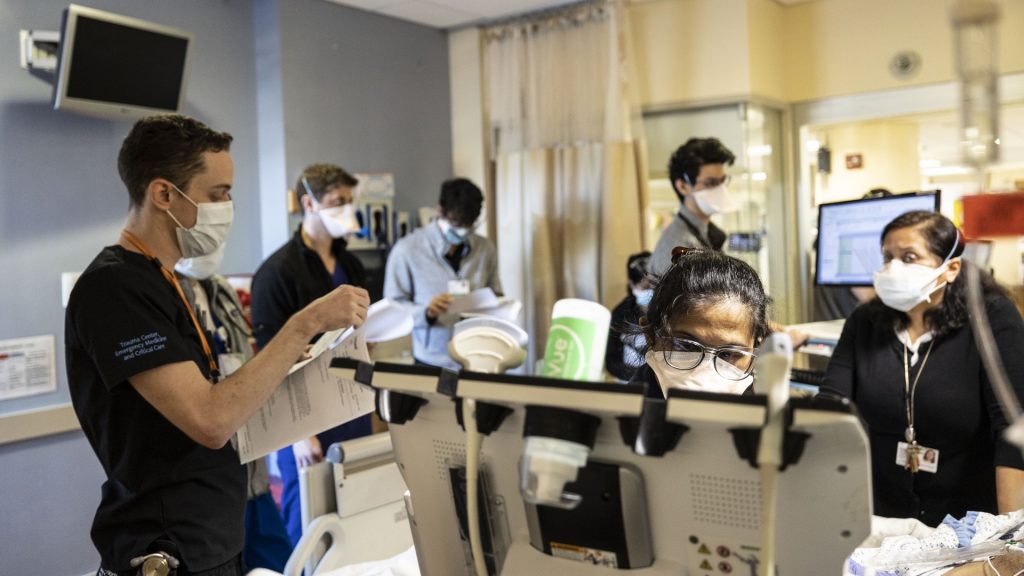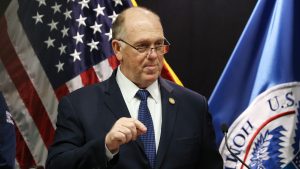Why so many doctors and nurses are walking away from health care jobs

As a nurse with two decades in the medical field, Jill Nicole was well-versed in hospitals. But landing in a hospital bed of her own after suffering severe autoimmune issues as a result of her job’s stress was not in the career plans she’d drawn up.
Nicole faced heightened levels of stress during the pandemic, leaving her dejected and disillusioned with the health care industry. And ultimately, she did what a growing number of professionals like her have chosen to do in recent years: She left nursing.
A recent study by Harris Poll found that 55% U.S. health care workers plan to look for job openings, interview for or switch to a new role in the next year.
Nicole traded in her scrubs for athleisure as she shifted from nursing to instructing Pilates. And, she told Straight Arrow News, she will never look back.
“I still use my nursing background and the pay is about the same,” said Nicole, who lives in Michigan. “I love not being tied to a clock or schedule, but I do miss putting on the scrubs. I felt important and respected until the pandemic.”
She felt a shift then, in 2020 and the years after, she said, when she was unable to access the personal protective equipment she required for her job. Inadequate staffing, the lack of resources and the abuse health care workers took at bedsides and behind the scenes all added up to Nicole feeling like she wasn’t valued, she said.

Why are health care workers leaving their field?
“I know my experience is not unique. The amount of colleagues I have that left the profession in the last three years is huge,” she told SAN. “I want leaders to know that there isn’t a nursing shortage, there’s a shortage of nurses that will put up with what they put us through.”
Harris Poll found that only one in three health care employees feel valued, satisfied and loyal to their current employer. Roughly half said they are considering quitting because their pay doesn’t reflect the value of their work.
With mounting responsibilities, limited advancement opportunities, and further cuts to public health, many health care workers are reevaluating their futures — especially young workers. Gen Z and millennials are the most likely to plan to quit their health care positions in the near future, according to the Harris Poll.
Younger, early-career employees, as well as nursing assistants and personal care aides are the hardest to retain, according to employer responses recorded by the poll. They’re also the most critical, Rebecca Purser, a senior research manager at Harris Poll, told SAN.
“The very people most essential to long-term workforce sustainability on the frontlines of care are also the most likely to leave,” Purser said. “If health care leaders want to stabilize their workforce and secure the future of patient care, supporting the educational aspirations of Gen Z is one of the smartest moves they can make.”

How did the pandemic affect health care worker burnout?
Anne Weisman, a professor at the University of Nevada, Las Vegas who teaches integrative medicine, said the pandemic was a massive breaking point for many in the industry, particularly those in hospice care.
“It was especially hard during the pandemic. There was no time to grief or to mourn,” said Weisman, whose COVID-era responsibilities included — among other things — establishing workshops to prepare health care workers to aid patients dying from COVID without their families present. “There was so much more death than they were used to seeing.”
The weight of science skepticism in health care and looming Medicaid cuts further strains health care workers, with roughly $1 trillion in cuts predicted over a decade according to the Congressional Budget Office.
Educational support is a major factor in retaining staff. The Harris study found 63% of health care employees would be more likely to stay with their employer if tuition support was provided.
Two-thirds of employees surveyed said their current income doesn’t allow them to pay up front for out-of-pocket education expenses, and 77% agree that they’d be more likely to use employer-sponsored tuition benefits if they were given PTO or time during work hours to study.
There are some bright lights in that landscape. Weisman pointed to UNLV’s inaugural medical school class, each member of which received a $25,000 scholarship to cover tuition — a crucial help in Nevada, which ranks among the bottom nationally for health care quality due to a large population increase, a shortage of providers who stay in the state and maternity care deserts.
“We need more training and pipelines… to get kids thinking about health care early on,” Weisman told SAN. “We need to encourage younger people to go into these fields and help us reimagine it. Connecting people early on is very key.”
Reducing stress among health care workers is key — especially given the stakes.

What happens when a doctor or nurse gets too stressed?
Charity Loring, a Michigan-based therapist and social worker, said it is common to see others in the medical field develop substance abuse habits.
“When I worked in the nonprofit sector, a lot of my coworkers would not give themselves breaks, used eating as a coping strategy, unhealthy foods, and overeating,” Loring told SAN. “A lot of them were overweight, had high blood pressure, and just did not take the time to soothe their own systems.”
According to Alcohol Help, 10 to 12% of health care professionals will develop a substance use disorder during their careers. This includes at least one in 10 physicians and 1 in 5 nurses. The pandemic increased the likelihood of developing addictions, while decreasing sleep and increasing levels of stress, anxiety and depression, according to the National Institute of Health.
Weisman and other health care professionals say that creating and maintaining community and connection is critical.
“Withdrawing, isolation, changes in hygiene or depersonalized language is really common with symptoms of burnout,” Weisman said. “I’m trying to intervene to keep their humanity intact.”
Stephen Sanders, a Florida-based family medicine doctor and men’s health specialist, said burnout won’t be fixed by telling health care workers to be more resilient. Health care workers don’t just need a paycheck, he said. They need a future in an industry they can believe in.
“In health care we need a perspective and culture shift that supports mental health, gives clinicians and other health care staff a voice, and lets them do what they came here to do, which is to heal people,” he told SAN. “That’s the only way we move from surviving the system to restoring purpose in it.”
In addition to education, Sanders said health care workers also need clear paths to career advancement. He has ideas for that: Recognizable leadership training programs; pairing young clinicians with mentors; and flexible schedules that respect life outside the job.
“Health care workers don’t feel underappreciated because of one thing. It’s… the weight of everything stacked against them,” he said. “It’s all these factors that surface and many I speak with feel unseen, undervalued and ready to walk away totally.”

What will it take to solve health care worker burnout?
Nataley Jiri returned to her job as a pediatrician four months after her first son was born, gobsmacked by the criticism she received for not working long hours beyond her schedule. Where, she wondered, was the support and understanding she needed to help her stay afloat?
Two months after her second son was born, she decided to walk away from being a full-time doctor for the next three to five years.
“The norm is that doctors just keep on giving to the system,” Jiri told SAN. “For a specialty that deals with kids and their development, I found it ironic that they still expect new moms to work like they don’t have kids.”
A generational shift in how workers prioritize work-life balance could help change the field in small, but meaningful ways during those next few years. Weisman said there has been a massive shift in how younger doctors and nurses deal with mental health and overworking that gives her hope.
“One of my former colleagues told me that people are going to have to retire or die before things change,” she said. “We have all lived through some crazy things, so now we should come together as a species to say that we should do something different. We’re really smart people who can do hard things, let’s just do this differently.”
The post Why so many doctors and nurses are walking away from health care jobs appeared first on Straight Arrow News.





